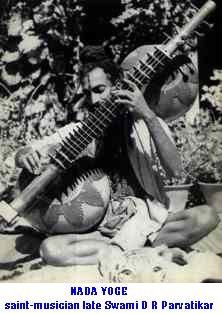NADA YOGA AND PHILOSOPHY

NADA YOGA AND PHILOSOPHY
Indian music has its essence in a deep sense of spirituality along with roots in Yoga and Indian philosophy. The theme of the compositions is mostly devotional in nature, and many of them also convey abstruse philosophical concepts in a form that is easy to grasp. Music itself, when practised with commitment, is also a form of Yoga. Music has a tremendous effect on the mental state of human beings as it results in peace, concentration, relaxation, spiritual elevation etc, which are the principles of Yoga and meditation. The practice of Yoga techniques, such as breath control and mental concentration, are also closely allied to the study of instrument vocal music.
According to Hindu philosophy, the word for pure sound is Nada Brahma. Nada has also been described by some as the energy of Brahma and it is believed that the propitiation of Nada leads to the attainment of Moksha (salvation), which is the ultimate goal of human life. Matanga has described Nada in his Brihaddesi thus:
„There is no song or music without Nada, there are no musical notes without Nada, there is no dance without Nada and the world is filled with the essence of Nada“.
The word Nada refers to the physical, the mystic and the religious or the cosmic sound. The sound that is produced by musical instruments is an object of sensory perception, as it is grasped by the sense of hearing. This is called Ahata Nada. In this context, the human voice is also a musical instrument. As described by Dr Acharya Trigunateet Jaimini in the composition, Sobhillu Saptaswara, the entire body, including the abdomen (Nabhi), heart (Hrt), neck (Kantha), mouth (Rasana) and nasal passages (Nasa), aids in the production of the sound.
> Meet Maestro Jaimini at facebook <
Just as the soul enlivens the human body, what gives life to this audible sound is the natural sound and rhythm of the human body. This is called Anahata Nada (unstruck sound). And as a musical instrument is also made to sing, so to speak, only by the power of conscious activity, it is the Anahata Nada that is behind the sound produced by instruments also. This is the primal divine force present in all living beings, and is a manifestation of Brahman. The same divinity is also the basis of the supreme powers of the universe, called Brahma, Vishnu and Siva. The cultivation or propitiation of the Anahata Nada is called Nada Yoga. This is described in the composition Mokshamu galada, as the combination (samyoga) of breath (Prana) and energy (Anala). As such, the practice of music itself can be a powerful method of Yogic practice. The music of great composers like Tyagaraja and others continues to captivate listeners even today, because it is the result of intense Nada Yoga. It elevates both the musician and the listener to a higher plane of human experience, and brings great joy and peace. Music has an intrinsic power that enables one to explore the inexhaustible depths of Yoga and scale the successive planes of Yogic experience.
Not only is music closely related to general spirituality and to Yoga, but the aesthetic experience is also closely related to Vedanta, the central philosophy of India. In the Natyasastra, Bharata says that the experience of aesthetic appreciation is a brother (sahodara) of the infinite bliss (Brahmananda) that is Brahman. The Upanishads repeatedly state that attaining Brahman is the highest pinnacle of bliss. In normal human activity, happiness and sorrow are always found to be intermixed. However, although music can convey the emotion of pathos very well, the aesthetic experience of listening to a piece of music, laden with pathos, can hardly be described as sorrowful or as one of unhappiness. Rather, one gets the feeling that the music has opened a window into the soul, and that is a highly stimulating and satisfying experience. This is what is said to be related to Brahmananda. It goes beyond the more mundane feelings of happiness and unhappiness. Ultimately, like Brahman itself, the true experience of music is so ineffable that words do not really do justice to it! Good music becomes a medium to convey a portion of this infinite reservoir of bliss, and is rightly praised as a means to liberation (moksha).
from-
Dr.Acharya Trigunateet Jaimini
VRINDAVAN
INDIA
e-mail : acharyajaimini@rediffmail.com
note- my Gurudava picture
Comments are closed.